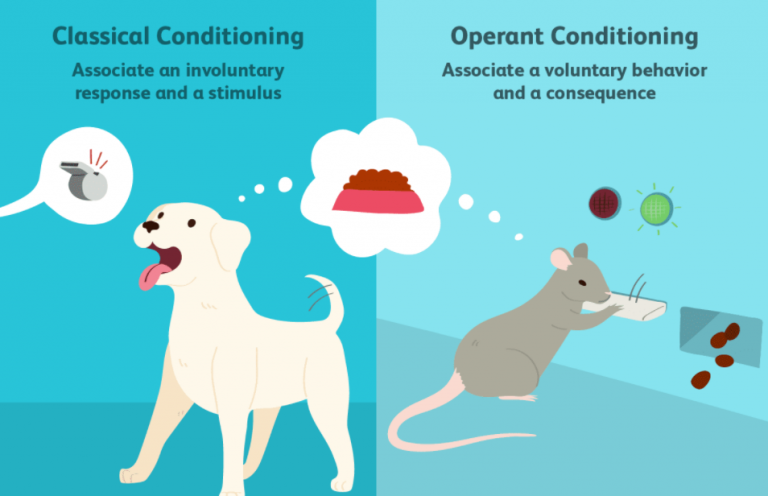How Are Behaviors Learned?
Have you ever questioned how our behaviors are learned? Meet Ivan Pavlov and B.F. Skinner, behavioral psychologists who pioneered the theories of classical and operant conditioning, respectively. Let’s take a look at how the theories they studied assist us recognize the manner the manner we acknowledge.
Classical Conditioning
First, let’s go to Mr. Pavlov. He studied what’s referred to as classical conditioning. You’ll every so often additionally listen this known as respondent conditioning. In classical conditioning, getting to know refers to involuntary responses that end result from reviews that arise earlier than a reaction.
Classical conditioning happens while you learn how to accomplice exclusive stimuli. No conduct is involved. The first stimulus that you may come upon is referred to as the unconditioned stimulus. An unconditioned stimulus produces a reaction with none preceding getting to know. This reaction is referred to as an unconditioned reaction.
For an instance of a stimulus that conjures up an unconditioned reaction, we could say a kiss. Kissing creates involuntary arousal responses; it reasons you to enjoy an expanded coronary heart charge, for instance. This is a herbal reaction, it isn’t learn, and it takes place automatically. The unconditioned stimulus in this case is the kiss, and the expanded coronary heart charge is the unconditioned reaction.

More Details
In classical conditioning, you presently upload a impartial stimulus to the enjoy. It is refer to as a impartial stimulus as it isn’t related to the unconditioned reaction. Thinking of our instance of a kiss, consider that your favor track is gambling while you kiss. The track might be the impartial stimulus. When the track is pair with kissing, your coronary heart charge nevertheless will increase due to the kiss. However, after repeated pairing of your favored track with the act of kissing, your mind will begin to think, ‘I listen my favored track, so kissing have to be going to show up soon!’
Because of this, you may enjoy an expanded coronary heart charge while you listen your favored track. Your mind is now associating your favored track with kissing. Rather than persevering with as a impartial stimulus, the track has turn out to be a conditioned stimulus as it produces a reaction without or with the incidence of kissing. The expanded coronary heart charge is an unconditioned reaction following kissing, however now additionally will become a conditioned reaction while it follows your favored track. It is a conditioned reaction following the track due to the fact the track might now no longer produce the expanded coronary heart charge if it had been now no longer related to the act of kissing.
Operant Conditioning
Next, let’s go to Mr. Skinner. He studied what’s refer to as operant conditioning. You’ll every so often additionally listen this known as instrumental conditioning. In operant conditioning, getting to know refers to modifications in conduct because of reviews that arise after a reaction.
Operant conditioning entails converting voluntary behaviors. A conduct reaction is accompanied via way of means of both reinforcement or punishment. Reinforcement following a conduct will motive the conduct to boom, however if conduct is accompanied via way of means of punishment the conduct will decrease.
Let’s pass returned to the instance of the kiss. What might show up if the man or woman positioned their palms round you and kissed you returned enthusiastically? This might be an instance of reinforcement and might possibly boom the probability which you might are searching for every other kiss from the man or woman.
An Overview
There are sorts of reinforcement. Positive reinforcement refers back to the addition of some thing positive. Examples of this will providing reward or a deal with while a favored conduct is display. Negative reinforcement happens while some thing unnecessary is eliminated every time a conduct is displays. Examples of this will be taking aspirin to take away a headache or doing the dishes to keep away from a combat together along with your roommate.
Because of its name, poor reinforcement is regularly harass with punishment. The key distinction is that poor reinforcement entails the elimination of a poor result to boom the probability of a reaction. Reinforcement continually will increase the incidence of a reaction, even as punishment continually decreases the incidence of a reaction.
Classical vs. Operant Conditioning
In operant conditioning, the learner is likewise reward with incentives. Even as classical conditioning entails no such enticements. Also, recollect that classical conditioning is passive at the a part of the learner. Also as operant conditioning calls for the learner to actively take part and carry out a few form of motion. That allows you to reward or punished.
For operant conditioning to work, the problem have to first show a conduct that may then be both reward or punish. Classical conditioning, on the alternative hand, entails forming an affiliation with a few kind of already evidently happening event.
Today, each classical and operant conditioning are applies for numerous functions. Via way of means of teachers, parents, psychologists, animal trainers, and lots of others. In animal conditioning, a teacher would possibly make use of classical conditioning via way of means of time and again pairing the sound of a clicker with the flavor of meals. Eventually, the sound of the clicker by myself will start to produce the identical reaction that the flavor of meals might.
In a study room setting, a instructor would possibly make use of operant conditioning via way of means of providing tokens as rewards for appropriate conduct.6 Students can then flip in those tokens to obtain a few form of reward, together with a deal with or more playtime. In every of those instances, the aim of conditioning is to provide a few kind of extra in conduct.



